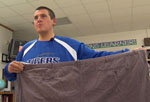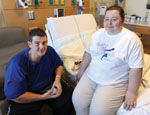|
By Dawn
Brazell
Public Relations
Not many
people can say they've lost 390
pounds in life.
Clay
Owens, 34, can. Now sporting a
healthier 270-pound frame, the
middle school history teacher
from Hemingway, who recently had
a skin removal procedure by
Dennis K. Schimpf, M.D., said he
feels he has his life back again
after a long season of failures.
 Clay Owens holds up
size 72 pants he no longer wears
after shedding 390 pounds.
Watch
a video at http://tinyurl.com/82bjgwc Clay Owens holds up
size 72 pants he no longer wears
after shedding 390 pounds.
Watch
a video at http://tinyurl.com/82bjgwc
The
former athlete took a turn for
the worse after he graduated
from high school. He then worked
for his grandmother, whom he
adored, in her country store,
but she was murdered on a day
Owens, then 18, had taken the
day off to watch a bowl game
during the holidays.
Guilt
haunted him because he was
supposed to have been there. He
coped with the stress by eating
emotionally, he said. To add to
the problems, he was in a bad
car wreck that broke nearly
every rib and set him back even
more.
Owens
settled into a routine of
emotional eating and inactivity
that culminated years later when
he found himself in the
emergency room in Georgetown in
2009 with a blood pressure of 41
over 30.
His wife,
Suzie, watched as the people on
either side of them in the
emergency room died. She feared
Clay would be next. A bariatric
bed capable of weighing Owens
was brought in, and the scale
hit 660 pounds. Owens remembers
his mother started crying
immediately when they read his
weight.
"I was
always very prideful. I thought
I could do it on my own," Owens
said. He had tried many times to
lose weight, and would be
successful for a time, but then
gain it back. "Six hundred and
sixty pounds will kill your
pride."
Medical
professionals in Georgetown
wouldn't touch him without him
losing weight, he said, a
catch-22 for him. He got a
referral to MUSC for a gastric
bypass. Surgeon T. Karl Byrne,
M.D., didn't hesitate. "He told
me, 'we can do it.'"
The next
hurdle was figuring out how to
pay for the $36,000 procedure
since his state insurance didn't
cover the procedure. As a
history teacher and coach, Owens
needed to raise $30,000. "That's
what I make in a year teaching,"
he said.
He fell
into a depression, and wanted to
give up. His wife wouldn't let
him.
"The
closer we got the more agitated
I got, and the more faithful she
got."
Owens
said he can look back and see
the wrong turns he took in life.
He worked two jobs in college
and made bad food choices.
His
weight gain interfered with his
coaching job and had caused him
to be removed from the football
field, with his coaching
restricted to the press box.
With coaching as his passion,
Owens hit a new low.
"I was
miserable. I only did what I
absolutely had to do. I taught
behind my desk. I wasn't a very
good teacher then. I'd sit in my
truck and watch the team
practice. Then I'd drive home,
eat and go to bed exhausted."
Embarrassed
by his weight, Owens said he
would stay home on weekends. He
would go to the mailbox and have
to stop several times just to
catch his breath. Stairs were
brutal. "You can imagine having
to walk 660 pounds up the
steps."
He was
limited in the public places he
could go, including movie
theaters. The worst part was to
see how children were afraid of
him, some even crying. "It just
broke my heart."
Somewhere
along the way Owens, who used to
see himself as a fighter, gave
up.
Fortunately,
his community did not.
 Clay and Suzie Owens
in a room at Ashley River Tower
Jan. 5 following a skin removal
surgery. Clay and Suzie Owens
in a room at Ashley River Tower
Jan. 5 following a skin removal
surgery.
After the
wake-up call in the emergency
room, Owens and his wife decided
it was time. He put pride aside
and asked for help. Owens said
he was amazed how colleagues and
students supported him. Each
week a student would show up
with a mason jar stuffed with
money and change sent from
another teacher who was raising
money for him. His church had a
community meeting to generate
ideas and a wide range of
fundraisers were planned from
gospel singing to an auction.
Despite
all the hard work, though, on
Dec. 15 – just three days before
the surgery – he was still
$5,000 short, and the bill had
to be paid up front.
"That
Sunday morning, we went to
church and I didn't want to be
there. I didn't think it was
going to happen. During the
singing, the church phone rang.
It never rings during church."
Owens
said his pastor went back to
answer it and came back telling
Owens he could relax, an
anonymous donor just gave him
the exact amount he needed. It
was a miracle, he said. Scared
of the huge change coming in his
life, Owens knew he couldn't let
down all the people who had
rallied behind him. He went in
for the required psychological
pre-counseling and found it very
helpful.
"If your
head's not right, you don't need
to go through it."
Owens had
the procedure done Dec. 18,
2009.
"Sometimes
you need a kick in the butt and
that kick in the butt can come
from technology and doctors who
think outside of the box. It's
not a cure. It's a tool. I use
that tool to lose weight. I knew
if I didn't do my part, it
wasn't going to happen."
Owens
certainly has done his part. His
breakfast of champions used to
be a Mountain Dew with roasted
peanuts and a honey bun, all
staples in his grandmother's
country store. That, of course,
has changed, and he's had to get
his family to support his
healthier diet. As he dropped
enough weight to be able to
exercise, he found he loved the
gym and he exercises twice a
day. He did the Cooper River
Bridge run last year.
A special
moment came during Hemingway
High School's 2010 football
season when the team asked him
to run out with them. Owens, who
is back to coaching on the
field, lined up with the team
and began running out. The next
thing he knew the team had
disappeared, and it was just him
running to break through the
banner. It was an emotional
time, he said.
Continuing
to adjust to his lighter frame,
Owens said he was pleased with
the skin removal procedure he
recently had done on his stomach
and chest, having almost 50
pounds of skin and fat removed.
The excess skin was pulling on
his frame and he was
experiencing some curvature in
the spine. "It's a daily routine
trying to keep the folds from
getting infected."
Owens
said he's grateful to his
school, community and the MUSC
medical staff who kept him
encouraged. He's especially
thankful for his wife. "She's
taken a lot of flak for me. For
the last two years, she's put
everything into getting me
straight."
His goal
now is to educate youth and the
public about following a healthy
lifestyle and advocating for
state health insurance coverage
for gastric bypass.
"There's
no reason insurance companies
shouldn't cover this. The state
plan will take care of things
for smokers as long as you pay extra money a year to let them
know you smoke, but they won't
cover a person who's overweight
to get a life changing, life
altering, life extending
surgery. For the life of me, I
can't understand it. I went five
times to the hospital in 2009
before my surgery and we added
up what they spent for me for
all that time in the hospital,
and they could have paid for my
gastric bypass two and a half
times."
Owens
said it feels good to take
responsibility for his health,
and that the gastric bypass and
skin removal surgeries have
given him his life back.
"This has
been a great platform for me.
Obesity had become my life.
Instead of eating to live, I
would live to eat," he said.
"Now, I'm a fighter again."
Gastric bypass procedure is
'jump-start some morbidly obese
people need' to get back on track
MUSC surgeon T.
Karl Byrne, M.D., said he's
pleased how well Clay Owens is
doing.
"Weight loss is
about genetics, willpower,
exercise, portion control,
choosing healthy food,
environmental effects, lifestyle
choices, correction of maladaptive
eating behavior and many other
factors."
Owens has been
doing all the right things. Byrne,
who also is advocating for state
health insurance to cover gastric
bypass, said the procedure is the
jump-start some morbidly obese
people need to be able to get back
on track.
"The public
needs to know that this is not
cosmetic surgery. The
complications of obesity can be
life threatening and very
expensive over the long term.
Studies show that bariatric
surgery can save lives and
dramatically reduce health care
costs."
Byrne said
Owens' story shows how much stress
not having coverage places on a
state worker.
"Clay had to
raise the money himself with
community help. Medicaid, however,
covers bariatric surgery so if you
are unemployed and on Medicaid you
can be covered. It makes no sense
that because you are a state
worker you are not covered for
surgery."
|



 Clay Owens holds up
size 72 pants he no longer wears
after shedding 390 pounds.
Clay Owens holds up
size 72 pants he no longer wears
after shedding 390 pounds. Clay and Suzie Owens
in a room at Ashley River Tower
Jan. 5 following a skin removal
surgery.
Clay and Suzie Owens
in a room at Ashley River Tower
Jan. 5 following a skin removal
surgery.